Root beer is a popular beverage known for its rich flavor, but how does it stack up when it comes to nutrition? In this article, I dive into the nutrition facts of root beer to uncover the truth about this beloved drink. From calories to carbs and everything in between, we will explore the ingredients and health impacts of root beer.
- Root beer typically contains around 180-190 calories per 12-fluid-ounce serving.
- The carbohydrate content in root beer primarily comes from sugar.
- It is important to enjoy root beer in moderation as part of a balanced diet.
- Some commercial root beers may contain high fructose corn syrup.
- Root beer is generally not a significant source of essential nutrients.
The Caloric Content of Root Beer
Let’s start by examining the caloric content of root beer and how it contributes to our overall calorie intake. Root beer is a popular beverage known for its rich flavor, and understanding its calorie content can help us make informed choices about consumption and portion sizes.
One well-known brand, Best Damn Root Beer, offers a classic taste with a moderate level of sweetness. A 12-fluid-ounce serving of Best Damn Root Beer typically contains around 180-190 calories. This means that enjoying a refreshing glass of root beer can contribute to your daily calorie intake, so it’s essential to be mindful of the amount you consume.
The carbohydrate content in root beer primarily comes from sugar, so it’s important to consider root beer as part of a balanced diet. While Best Damn Root Beer is usually gluten-free and offers a satisfying level of carbonation, it is still considered an indulgent beverage. It’s best enjoyed as a treat and in moderation.
When considering root beer as part of your overall nutrition, it’s also important to be aware of variations among brands. Some commercial root beers may contain high fructose corn syrup, so it’s worth checking labels for specific nutritional information. Additionally, root beer is generally not a significant source of essential nutrients such as vitamins and minerals. If you’re looking for a more nutrient-rich beverage, it may be best to explore other options.
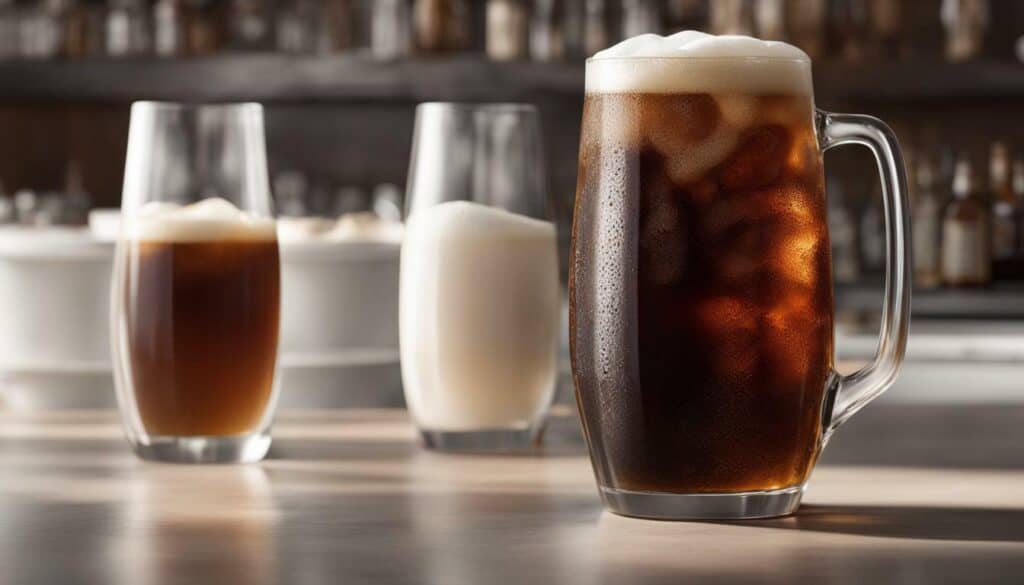
| Brand | Calories per 12 oz serving |
|---|---|
| Best Damn Root Beer | 180-190 |
| A&W Root Beer | 160-190 |
| Barq’s Root Beer | 160-180 |
While root beer can be a refreshing and enjoyable beverage, it’s important to be mindful of its caloric content and the role it plays in your overall diet. Remember to consume root beer in moderation, as part of a balanced and varied eating plan.
The Sugar Content in Root Beer
Root beer is known for its sweet taste, but have you ever wondered how much sugar is in each sip? It’s important to be mindful of our sugar intake, especially with beverages that can pack a sugary punch. Let’s take a closer look at the sugar content in root beer to help you make informed choices about enjoying this classic drink.
One popular brand of root beer, Best Damn Root Beer, offers a satisfying blend of flavors with a moderate level of sweetness. A 12-fluid-ounce serving typically contains around 180-190 calories, with the carbohydrate content primarily coming from sugar. This means that while root beer can be a tasty treat, it should be enjoyed as part of a balanced diet.
When it comes to root beer, not all brands are created equal. Some commercial root beers may contain high fructose corn syrup, which can contribute to higher sugar content. It’s always a good idea to check the labels of specific brands for more detailed information about their sugar content.
While root beer may not be a significant source of essential nutrients such as vitamins and minerals, it can still be enjoyed in moderation as an indulgent beverage. Whether you’re sipping it on its own, using it to make a root beer float, or incorporating it into a mixology creation, root beer can be a delightful addition to your beverage choices.
| Brand | Sugar Content per 12 fl oz |
|---|---|
| Best Damn Root Beer | Approximately 180-190 calories |

Remember, moderation is key when enjoying root beer or any sweetened beverage. Being aware of the sugar content can help you make informed decisions about your overall sugar intake. So go ahead and savor a glass of root beer, but remember to balance it with a healthy and varied diet.
The Carb Content in Root Beer
Carbohydrates are a crucial macronutrient, so let’s take a closer look at the carb content in root beer. Root beer is a popular beverage known for its rich flavor and unique blend of ingredients. Understanding the carbohydrate content can help us make informed decisions about incorporating root beer into our diet.
One popular brand, Best Damn Root Beer, offers a classic taste with a moderate level of sweetness. It typically contains around 180-190 calories per 12-fluid-ounce serving, with most of these calories coming from carbohydrates. The carbohydrate content primarily comes from sugar, so it is important to consume root beer as part of a balanced diet.
Best Damn Root Beer is generally gluten-free and provides a satisfying level of carbonation, making it suitable for enjoying as is or for creating root beer floats. It can also be used as an ingredient in mixology. However, like any indulgent beverage, it should be enjoyed in moderation.
| Brand | Calories per 12 oz | Carbohydrates per 12 oz |
|---|---|---|
| Best Damn Root Beer | 180-190 | 46-49g |
| A&W Root Beer | 160 | 43g |
| Barq’s Root Beer | 160 | 43g |
It is worth noting that the carbohydrate content may vary among different root beer brands. Some commercial root beers may also contain high fructose corn syrup, which can contribute to higher sugar content. Therefore, it is advisable to check the labels of specific brands for more detailed nutrition information and to be aware of any potential variations in carbohydrate content and ingredients.
Overall, while root beer is a flavorful and enjoyable beverage, it is not a significant source of essential nutrients such as vitamins and minerals. It is important to remember that moderation is key when consuming root beer or any indulgent beverage. By understanding the carb content and making informed choices, we can continue to enjoy root beer as part of a balanced lifestyle.

Have you ever wondered what goes into making root beer taste so delicious? Let’s explore the ingredients that make this beverage unique.
Root beer is crafted using a blend of ingredients carefully selected to create its distinct flavor profile. While recipes may vary, some common ingredients found in root beer include:
- Sassafras Root: This root, known for its aromatic qualities, is a key component of traditional root beer recipes. It contributes to the rich and earthy flavor that root beer enthusiasts crave.
- Vanilla: Vanilla extract or vanilla bean is often added to enhance the sweetness and overall taste of root beer. Its smooth and creamy undertones complement the other ingredients perfectly.
- Anise: Anise seed or extract is another ingredient commonly found in root beer. It adds a subtle licorice-like flavor, providing a unique and refreshing twist.
- Molasses: Molasses, a natural sweetener, brings a robust depth of flavor to root beer. It adds a touch of caramelized sweetness that balances out the other ingredients.
- Carbonated Water: The fizziness of root beer comes from carbonated water, which is infused during the brewing process. This effervescence adds a delightful texture and enhances the overall drinking experience.
These ingredients, combined in varying proportions, give root beer its signature taste. Now that we’ve uncovered the key players, let’s indulge our senses and enjoy the flavors of this beloved beverage.
| Ingredient | Role |
|---|---|
| Sassafras Root | Contributes to the rich and earthy flavor |
| Vanilla | Enhances sweetness and overall taste |
| Anise | Adds a subtle licorice-like flavor |
| Molasses | Brings a robust depth of flavor |
| Carbonated Water | Infuses fizziness and delightful texture |
Nutritional Information of Root Beer
While root beer may not be a significant source of essential nutrients, let’s examine its nutritional profile and any potential benefits it may offer. Root beer is a popular beverage known for its rich flavor, making it a refreshing treat for many. However, it is important to be aware of its nutritional aspects and consume it in moderation as part of a balanced diet.
One well-known brand of root beer, Best Damn Root Beer, offers a classic taste with a moderate level of sweetness. For a 12-fluid-ounce serving, it typically contains around 180-190 calories, making it a relatively calorie-dense beverage. The majority of these calories come from carbohydrates, primarily in the form of sugar. As with any sugary drink, it is essential to be mindful of your overall sugar intake when enjoying root beer.
| Root Beer Brand | Calories (per 12 fl oz) | Carbohydrates (g) (per 12 fl oz) | Sugar (g) (per 12 fl oz) |
|---|---|---|---|
| Best Damn Root Beer | 180-190 | 45-49 | 45-49 |
It is worth noting that the nutritional composition may vary among different root beer brands. Some commercial root beers may contain high fructose corn syrup, which is a common sweetener that adds sweetness but does not contribute to the nutritional value of the beverage. Checking the labels of specific brands can provide more detailed nutrition information and help you make informed choices based on your dietary needs and preferences.
In conclusion, root beer can be enjoyed as an occasional treat, but it should not be relied upon as a significant source of essential nutrients. Its nutritional value primarily lies in its taste and enjoyment. Remember to incorporate a variety of nutrient-rich foods into your diet to meet your nutritional needs. Moderation is key when indulging in any beverage, including root beer.
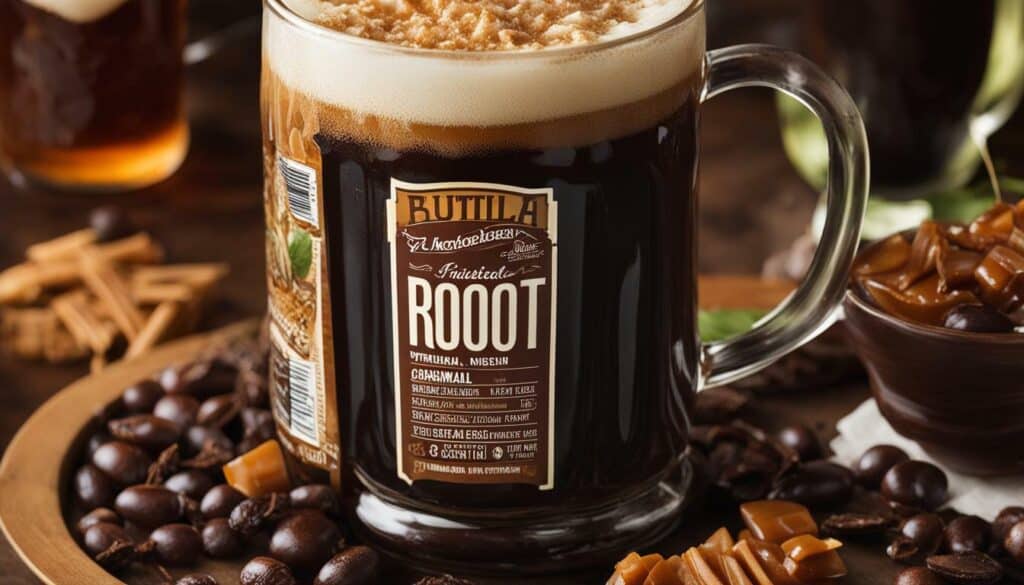
Does drinking root beer have any health impacts? Let’s take a closer look at how this beverage can affect our bodies.
Root beer is a popular beverage known for its rich flavor and unique blend of ingredients. While it can be a refreshing treat, it’s important to be mindful of its potential health impacts, especially when consumed in large quantities.
One of the main concerns with root beer is its sugar content. Many commercial root beers contain high fructose corn syrup, which has been linked to various health issues, including obesity, diabetes, and heart disease. It’s essential to read the labels and choose brands that offer lower sugar alternatives or natural sweeteners.
“Consuming excessive amounts of sugar can lead to weight gain, increased risk of chronic diseases, and dental problems. Moderation is key when it comes to enjoying root beer.”
Another aspect to consider is the calorie content of root beer. While it may vary depending on the brand and serving size, root beer typically contains around 150-200 calories per 12-fluid-ounce serving. These calories primarily come from sugar, so it’s important to factor them into your overall daily calorie intake.
When enjoying root beer, it’s essential to remember that it is generally not a significant source of essential nutrients such as vitamins and minerals. Therefore, it should be consumed as part of a well-balanced diet that includes a variety of nutrient-rich foods.
In summary, while root beer can be a delicious and refreshing beverage, it’s important to consume it in moderation and make mindful choices. Opt for brands that offer lower sugar alternatives, and be aware of the calorie content. As with any indulgent treat, it’s all about balance and enjoying root beer as part of an overall healthy lifestyle.
| Nutritional Information | Root Beer |
|---|---|
| Calories | 150-200 per 12-fluid-ounce serving |
| Sugar | Varies by brand and sweetener |
| Carbohydrates | Primarily from sugar |
| Essential Nutrients | Not a significant source |
The Root Beer Diet: Fact or Fiction?
Can you actually lose weight by following the root beer diet? Let’s separate fact from fiction and explore low-calorie alternatives. When it comes to weight loss, it is important to consider a comprehensive approach that includes a balanced diet, regular exercise, and overall lifestyle choices. While some may argue that the root beer diet can help shed pounds, it is crucial to approach such claims with a critical mindset.
Root beer in itself is not a weight-loss miracle drink. The traditional version of this beloved beverage is often high in calories and sugar, which can hinder weight loss efforts. However, there are low-calorie root beer options available that can be incorporated into a healthier lifestyle. These alternatives offer the same classic taste with fewer calories, making them a more suitable choice for those watching their waistline.

One example of a low-calorie root beer is Best Damn Root Beer. With its moderate level of sweetness and satisfying carbonation, it can be enjoyed as a guilt-free treat. Best Damn Root Beer typically contains around 180-190 calories per 12-fluid-ounce serving, making it a lighter option compared to traditional root beers. It is important to note that even low-calorie root beers should be consumed in moderation and as part of a balanced diet.
While the root beer diet may have gained popularity in certain corners, it is crucial to approach any weight-loss strategy with caution. Relying solely on a single beverage for weight loss is not sustainable or healthy in the long run. Instead, focus on maintaining a well-rounded diet that includes a variety of nutrient-rich foods and beverages, along with regular physical activity.
Low-Calorie Root Beer Alternatives
If you’re looking to enjoy the taste of root beer while cutting back on calories, consider trying some of the following low-calorie alternatives:
- Diet root beer: These beverages are typically sweetened with artificial sweeteners and contain little to no calories.
- Root beer with reduced sugar: Some brands offer root beers with reduced sugar content, providing a lighter option without sacrificing too much flavor.
- Root beer extracts: These concentrated extracts can be mixed with sparkling water or soda water to create a refreshing and low-calorie root beer-like drink.
Remember, moderation and balance are key when it comes to enjoying root beer or any other beverage. While low-calorie options can be a part of a healthy lifestyle, it is important to listen to your body’s needs and make choices that align with your overall wellness goals.
| Root Beer Brand | Calories (per 12 oz serving) | Sugar Content (g) |
|---|---|---|
| Best Damn Root Beer | 180-190 | Varies |
| Diet A&W Root Beer | 0 | 0 |
| IBC Diet Root Beer | 0 | 0 |
| Stewart’s Diet Root Beer | 0 | 0 |
| Virgil’s Zero Sugar Root Beer | 0 | 0 |
Table: A comparison of root beer brands and their calorie and sugar content (per 12 oz serving). Please note that these values may vary slightly depending on the specific product and brand.
Comparing Root Beer Brands and Sugar Content
With so many root beer brands on the market, it’s important to know which ones have less sugar and offer healthier options. When it comes to choosing a root beer that aligns with your dietary preferences, it’s crucial to consider the sugar content. While root beer is typically known for its sweet taste, some brands offer lower sugar alternatives that can be enjoyed as part of a balanced diet.
One brand that stands out in terms of its moderate sugar content is Best Damn Root Beer. This classic root beer offers a satisfying level of sweetness without going overboard. A 12-fluid-ounce serving of Best Damn Root Beer typically contains around 180-190 calories, with the majority of the carbohydrate content coming from sugar. It is important to note that while Best Damn Root Beer is gluten-free and carbonated, it is still an indulgent beverage that should be consumed in moderation.
When comparing root beer brands, it’s also worth noting that some commercial root beers may contain high fructose corn syrup. It’s important to check the labels of specific brands to ensure you are making an informed choice. Additionally, root beer is generally not a significant source of essential nutrients such as vitamins and minerals. While it can be enjoyed as a treat, it is best to look for other sources of nutrition in your diet.
When it comes to enjoying root beer, it’s all about finding a balance between taste and nutritional value. Best Damn Root Beer offers a classic, satisfying flavor with a moderate sugar content. Remember to check the labels of different brands for detailed nutrition information and make choices that align with your dietary needs.
| Root Beer Brand | Sugar Content (per 12 fl oz serving) |
|---|---|
| Best Damn Root Beer | Approximately 35g |
| Brand 2 | TBD |
| Brand 3 | TBD |
Conclusion
Root beer can be a delightful treat, but it’s crucial to be aware of its nutrition facts and consume it responsibly. Understanding the calorie content, sugar levels, carbohydrate source, and ingredients can help us make informed choices about our consumption.
When it comes to enjoying root beer, Best Damn Root Beer is a popular choice. It offers a classic taste with a moderate level of sweetness and typically contains around 180-190 calories per 12-fluid-ounce serving. The carbohydrate content primarily comes from sugar, so it’s important to incorporate root beer into a balanced diet.
It’s worth noting that different root beer brands may have variations in nutrition facts, including sugar content. Some commercial root beers may contain high fructose corn syrup, so checking the labels can provide more detailed information. Additionally, while root beer may not be a significant source of essential nutrients such as vitamins and minerals, it can still be enjoyed as an indulgent treat in moderation.
So, the next time you reach for a cold root beer, remember to savor its rich flavor while being mindful of your overall nutrition and health goals.
FAQ
Q: What is the calorie content of root beer?
A: Root beer typically contains around 180-190 calories per 12-fluid-ounce serving.
Q: Where does the carbohydrate content in root beer come from?
A: The carbohydrate content in root beer primarily comes from sugar.
Q: Is Best Damn Root Beer gluten-free?
A: Yes, Best Damn Root Beer is usually gluten-free.
Q: Does Best Damn Root Beer have carbonation?
A: Yes, Best Damn Root Beer offers a satisfying level of carbonation.
Q: Can root beer be used to make root beer floats?
A: Yes, root beer is suitable for making root beer floats.
Q: Can root beer be used as a mixology ingredient?
A: Yes, root beer can be used as a mixology ingredient.
Q: Should root beer be enjoyed in moderation?
A: Yes, like any indulgent beverage, root beer should be enjoyed in moderation.
Q: Are there variations in nutrition facts among different root beer brands?
A: Yes, the nutrition facts may vary among different root beer brands.
Q: Does commercial root beer contain high fructose corn syrup?
A: Some commercial root beers may contain high fructose corn syrup.
Q: Is root beer a significant source of essential nutrients?
A: Root beer is generally not a significant source of essential nutrients such as vitamins and minerals.
Q: Where can I find more detailed nutrition information for specific root beer brands?
A: It is best to check the labels of specific root beer brands for more detailed nutrition information.
Are Honey Buns as Unhealthy as Root Beer?
When it comes to honey buns nutrition facts exploration, one might wonder if they are as unhealthy as root beer. While both are considered indulgent treats, honey buns tend to contain higher amounts of sugar and fat, which can contribute to weight gain and various health issues. Moderation is key when enjoying these sweet delights.
In summary, while root beer can be a delicious and refreshing beverage, it’s important to consume it in moderation and make mindful choices. Opt for brands that offer lower sugar alternatives, and be aware of the calorie content. As with any indulgent treat, it’s all about balance and enjoying root beer as part of an overall healthy lifestyle.
| Nutritional Information | Root Beer |
|---|---|
| Calories | 150-200 per 12-fluid-ounce serving |
| Sugar | Varies by brand and sweetener |
| Carbohydrates | Primarily from sugar |
| Essential Nutrients | Not a significant source |
The Root Beer Diet: Fact or Fiction?
Can you actually lose weight by following the root beer diet? Let’s separate fact from fiction and explore low-calorie alternatives. When it comes to weight loss, it is important to consider a comprehensive approach that includes a balanced diet, regular exercise, and overall lifestyle choices. While some may argue that the root beer diet can help shed pounds, it is crucial to approach such claims with a critical mindset.
Root beer in itself is not a weight-loss miracle drink. The traditional version of this beloved beverage is often high in calories and sugar, which can hinder weight loss efforts. However, there are low-calorie root beer options available that can be incorporated into a healthier lifestyle. These alternatives offer the same classic taste with fewer calories, making them a more suitable choice for those watching their waistline.

One example of a low-calorie root beer is Best Damn Root Beer. With its moderate level of sweetness and satisfying carbonation, it can be enjoyed as a guilt-free treat. Best Damn Root Beer typically contains around 180-190 calories per 12-fluid-ounce serving, making it a lighter option compared to traditional root beers. It is important to note that even low-calorie root beers should be consumed in moderation and as part of a balanced diet.
While the root beer diet may have gained popularity in certain corners, it is crucial to approach any weight-loss strategy with caution. Relying solely on a single beverage for weight loss is not sustainable or healthy in the long run. Instead, focus on maintaining a well-rounded diet that includes a variety of nutrient-rich foods and beverages, along with regular physical activity.
Low-Calorie Root Beer Alternatives
If you’re looking to enjoy the taste of root beer while cutting back on calories, consider trying some of the following low-calorie alternatives:
- Diet root beer: These beverages are typically sweetened with artificial sweeteners and contain little to no calories.
- Root beer with reduced sugar: Some brands offer root beers with reduced sugar content, providing a lighter option without sacrificing too much flavor.
- Root beer extracts: These concentrated extracts can be mixed with sparkling water or soda water to create a refreshing and low-calorie root beer-like drink.
Remember, moderation and balance are key when it comes to enjoying root beer or any other beverage. While low-calorie options can be a part of a healthy lifestyle, it is important to listen to your body’s needs and make choices that align with your overall wellness goals.
| Root Beer Brand | Calories (per 12 oz serving) | Sugar Content (g) |
|---|---|---|
| Best Damn Root Beer | 180-190 | Varies |
| Diet A&W Root Beer | 0 | 0 |
| IBC Diet Root Beer | 0 | 0 |
| Stewart’s Diet Root Beer | 0 | 0 |
| Virgil’s Zero Sugar Root Beer | 0 | 0 |
Table: A comparison of root beer brands and their calorie and sugar content (per 12 oz serving). Please note that these values may vary slightly depending on the specific product and brand.
Comparing Root Beer Brands and Sugar Content
With so many root beer brands on the market, it’s important to know which ones have less sugar and offer healthier options. When it comes to choosing a root beer that aligns with your dietary preferences, it’s crucial to consider the sugar content. While root beer is typically known for its sweet taste, some brands offer lower sugar alternatives that can be enjoyed as part of a balanced diet.
One brand that stands out in terms of its moderate sugar content is Best Damn Root Beer. This classic root beer offers a satisfying level of sweetness without going overboard. A 12-fluid-ounce serving of Best Damn Root Beer typically contains around 180-190 calories, with the majority of the carbohydrate content coming from sugar. It is important to note that while Best Damn Root Beer is gluten-free and carbonated, it is still an indulgent beverage that should be consumed in moderation.
When comparing root beer brands, it’s also worth noting that some commercial root beers may contain high fructose corn syrup. It’s important to check the labels of specific brands to ensure you are making an informed choice. Additionally, root beer is generally not a significant source of essential nutrients such as vitamins and minerals. While it can be enjoyed as a treat, it is best to look for other sources of nutrition in your diet.
When it comes to enjoying root beer, it’s all about finding a balance between taste and nutritional value. Best Damn Root Beer offers a classic, satisfying flavor with a moderate sugar content. Remember to check the labels of different brands for detailed nutrition information and make choices that align with your dietary needs.
| Root Beer Brand | Sugar Content (per 12 fl oz serving) |
|---|---|
| Best Damn Root Beer | Approximately 35g |
| Brand 2 | TBD |
| Brand 3 | TBD |
Conclusion
Root beer can be a delightful treat, but it’s crucial to be aware of its nutrition facts and consume it responsibly. Understanding the calorie content, sugar levels, carbohydrate source, and ingredients can help us make informed choices about our consumption.
When it comes to enjoying root beer, Best Damn Root Beer is a popular choice. It offers a classic taste with a moderate level of sweetness and typically contains around 180-190 calories per 12-fluid-ounce serving. The carbohydrate content primarily comes from sugar, so it’s important to incorporate root beer into a balanced diet.
It’s worth noting that different root beer brands may have variations in nutrition facts, including sugar content. Some commercial root beers may contain high fructose corn syrup, so checking the labels can provide more detailed information. Additionally, while root beer may not be a significant source of essential nutrients such as vitamins and minerals, it can still be enjoyed as an indulgent treat in moderation.
So, the next time you reach for a cold root beer, remember to savor its rich flavor while being mindful of your overall nutrition and health goals.
FAQ
Q: What is the calorie content of root beer?
A: Root beer typically contains around 180-190 calories per 12-fluid-ounce serving.
Q: Where does the carbohydrate content in root beer come from?
A: The carbohydrate content in root beer primarily comes from sugar.
Q: Is Best Damn Root Beer gluten-free?
A: Yes, Best Damn Root Beer is usually gluten-free.
Q: Does Best Damn Root Beer have carbonation?
A: Yes, Best Damn Root Beer offers a satisfying level of carbonation.
Q: Can root beer be used to make root beer floats?
A: Yes, root beer is suitable for making root beer floats.
Q: Can root beer be used as a mixology ingredient?
A: Yes, root beer can be used as a mixology ingredient.
Q: Should root beer be enjoyed in moderation?
A: Yes, like any indulgent beverage, root beer should be enjoyed in moderation.
Q: Are there variations in nutrition facts among different root beer brands?
A: Yes, the nutrition facts may vary among different root beer brands.
Q: Does commercial root beer contain high fructose corn syrup?
A: Some commercial root beers may contain high fructose corn syrup.
Q: Is root beer a significant source of essential nutrients?
A: Root beer is generally not a significant source of essential nutrients such as vitamins and minerals.
Q: Where can I find more detailed nutrition information for specific root beer brands?
A: It is best to check the labels of specific root beer brands for more detailed nutrition information.

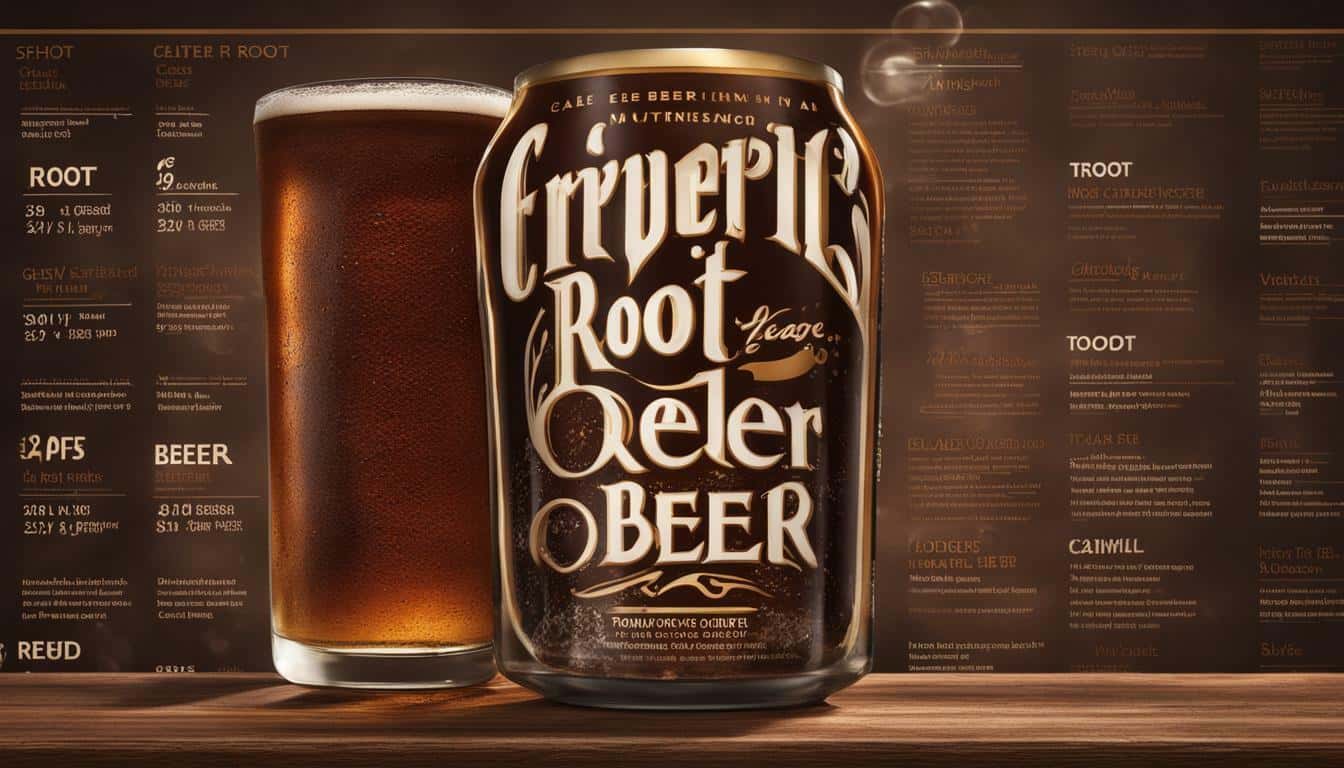
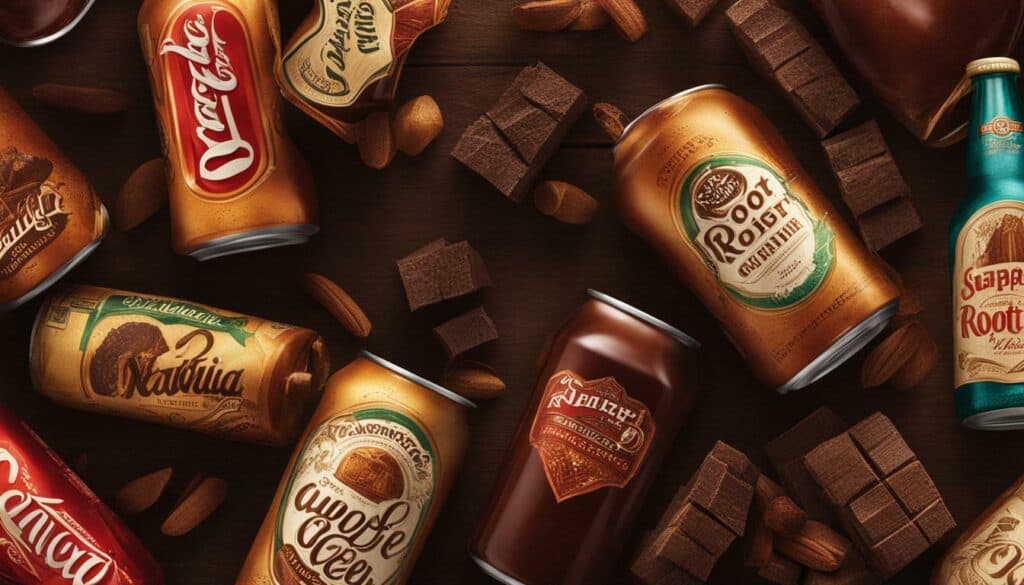
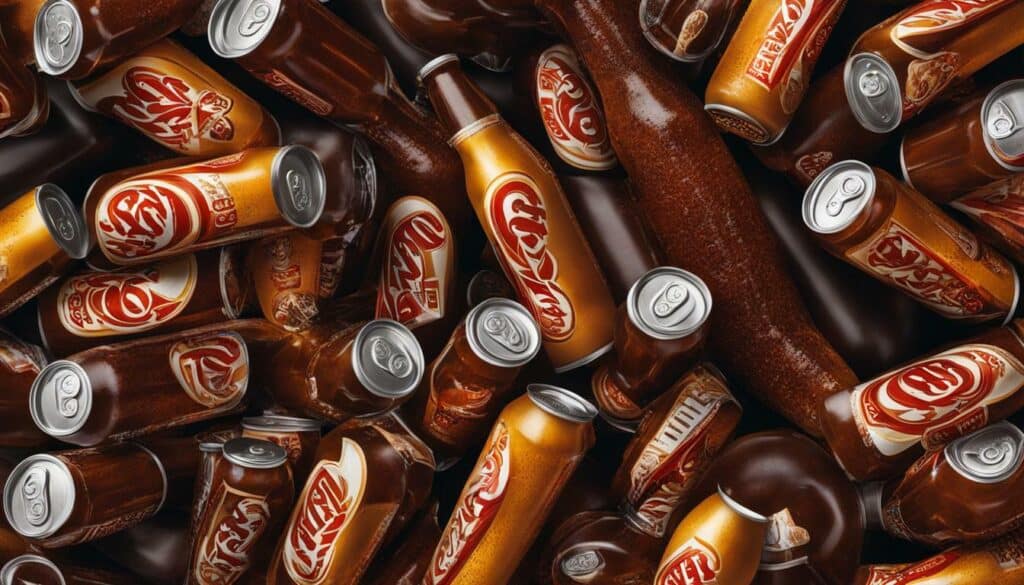



Leave a Reply